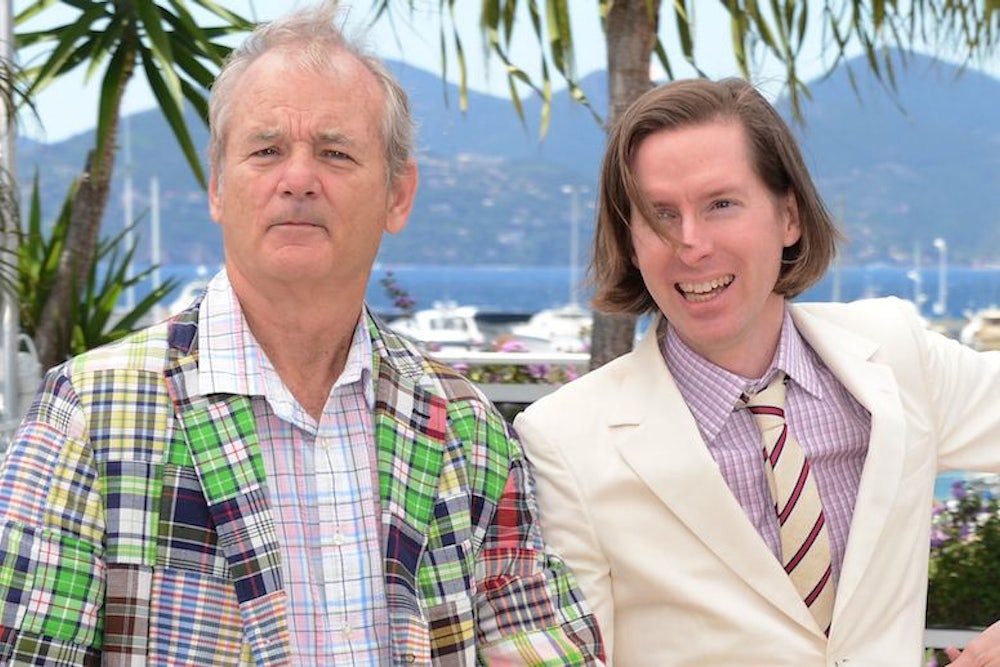The trailer for director Wes Anderson’s next movie, due out in 2014 and called The Grand Budapest Hotel, came out Thursday. It features harpsichord-esque background music, a madcap plot, impish hipster humor made funnier by contrast to its opulent surroundings, and lots of shots of characters framed in the center, as though they are on a stage.
The poster dropped earlier this week. It is dominated by the emponymous hotel, which looks like a big wedding cake, set in front of a gorgeous, self-consciously fake alpine backdrop. In Archer font set in Pez candy yellow, red, and light-purple, it announces the cast. There’s Adrien Brody, and there’s Jeff Goldblum. Owen Wilson—of course. Jason Schwartzman, naturellement. Bill Murray? Bill Murray.
In other words, the new Wes Anderson film is—to borrow The Atlantic Wire’s usefully tautological adjective—“Wes Anderson-y.” But to say that the new Anderson film seems like a parody of an Anderson film is misleading: It implies that there are Wes Anderson things that aren’t self-parodies. With the arguable exception of Bottle Rocket, his very first film, which was made on a shoestring budget, every feature in his filmography is self-consciously twee, precious, exquisite—so idiosyncratically his that the only way to succinctly describe what distinguishes any part of his canon is via reference to the rest of his canon.
For so-called “auteurist” film critics, this is the essential mark of a master. “I think that’s how you find a good filmmaker,” The New Yorker’s Richard Brody, who has profiled Anderson and written the book on French director Jean-Luc Godard, told me Thursday. “He is someone who has a coherent worldview that comes alive in many different films.”
For most moviegoers, though, how you feel about Anderson tends to break down into how you feel about his style. If you like it, then you like the fact that he sticks to it; if you hate it, then you hate the fact that he sticks to it. A quick Twitter search reveals reactions to the new trailer breaking in one of those two directions. “I’m happy that we have appeared to reach the Wes Anderson backlash backlash.” “The new Wes Anderson trailer (!!!) is everything you want and more.” On the other hand: “New Wes Anderson film is called Grand Budapest Hotel. Odd; that sounds sprawling, ornate & emotionally forbidding.” “I’m sure Wes Anderson’s new film is just precious.”
Actually, I think Anderson’s films vary in quality, even if they all contain his signature palette, shots, and themes (growing up, parents and kids, nostalgia). Some works are sublime: Rushmore, “Hotel Chevalier,” Fantastic Mr. Fox, this American Express commercial. Some are actively annoying, in no small part because of all the finicky trademarks: The Royal Tenenbaums, The Life Aquatic with Steve Zissou, The Darjeeling Limited, to a lesser extent Moonrise Kingdom.
But I am excited there is a new Anderson film, even knowing full well that it is roughly as likely to end up in the latter category as the former. Consistency is today the hallmark of our most valuable artists. There is so much stuff produced now—so many movies and albums and books and articles and magazines and browser tabs and Internet memes and hashtag jokes and autotuned crying babies and athlete Instagrams and museum shows and, yes, blog posts. Sometimes word of mouth (or extremely good publicity) guides us to what we should be devoting our ever-diminishing quantity of attention to; occasionally we might be really lucky to happen upon the thing itself. Most of the time, though, we miss what is great, and what is good is not fully appreciated, divorced as it is from a larger context. Increasingly, everything, even works of art, feel like really good BuzzFeed posts: Charming, satisfying, and completely self-contained.
Works produced by artists like Anderson are different. There is inherent virtue to their having a dominant style, even if any individual one is bad. It gives us something to talk about (and to read books about: New York’s Matt Zoller Seitz has a brand-new volume on Anderson). It gives us someone to argue over. It gives us a context in which to enjoy something.
“The very nature of art is somebody who is trying to say something by means of a certain craft. All art really is one person communicating to another,” Brody told me. “And that’s why we care about it. It’s not the admiration of craftsmanship. It’s contact with another soul.”
By “another soul,” Brody meant the artist. But it applies to everyone. Popular artists with singular visions allow an immediate intimacy with the soul of anyone else who knows the artist’s work, whether they love it or hate it. In our culture, fractured like a mirror that’s been hit with a baseball, there is nothing more special than a common reference point.
